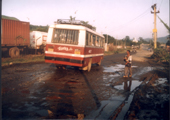 |
| Picture by S.H. Patgiri |
Yasmin Saikia pursues history with a rare zeal. The noted historian and writer is particularly interested in chasing the past to generate hope for the future ? in her own words.
Saikia, who teaches history at the University of North Carolina in the US, returns to her homeland whenever she can make time from her demanding job.
?I make it a point to come to Guwahati within a gap of every six months to see my ailing mother. More importantly, the unique charm of the place chases me no matter wherever I am on the earth. The fragrance of the greenery here is etched on my nose since my childhood,? Saikia said.
?No matter wherever I am, the warmth of Guwahati is something for which I crave and I feel abandoned if I cannot have a glimpse of my mother and motherland for too long.?
Saikia recently attended a seminar in the city on ?Towards a New Asia ? Trans-nationalism and Northeast India?.
She delivered a lecture on the topic ?Waking up to Our Southeast Asian Roots: Tai-Ahom Shows the Way? in the seminar.
The seminar was organised by the Centre for Northeast India, Southeast Asia Studies (CENISEAS) and the Omeo Kumar Das Institute of Social Change and Development, Guwahati.
?Tai-Ahoms were mainly instrumental in building and encouraging renewed interaction with neighbours and friends in Southeast Asia, particularly Thailand, to engage them as potential partners for developing a rich hybrid history and an economy that could benefit the region in multiple ways,? she said in the seminar.
Her whole discourse minutely investigated the processes of interactions and exchanges forged by the Tai-Ahom leaders and followers with Thai academics and interest groups in the last two decades of the 20th century.
After completing her schooling in Guwahati, Saikia did her bachelors and masters in history from Aligarh Muslim University.
Thereafter she proceeded to do her doctorate in the subject from the University of Winsconsin, Madison. She had also worked for a few months at Cotton College in the city.
At present an assistant professor of history at the University of North Carolina in Chapel Hill of North Carolina, Saikia?s main research interests include national and regional identity movements with specialisation in South Asia.
Saikia has authored two books so far ? In the Meadows of Gold: Telling Tales of the Swargadeos at the Crossroads of Assam (publishers: Spectrum Publications, Delhi, year 1997) and Fragmented Memories: Struggling to be Thai-Ahom in India (publishers: Duke University Press, Durham, yet to be released).
?My first two books deal with the lesser known dynasty of Asom who ruled Assam for six long centuries, an achievement of sort as no dynasty in the world ever ruled over any place for so long,? she said.
?I hope that all the myths and queries about the stupendous rule of Asom will be no longer an enigma for the world after my two books, where I have gone deep inside to dig history from the royal tombs,? she said.
As of now, Saikia is deeply engrossed in her third venture. This time she has touched upon the sensitive topic of the Bangladesh war of independence in the year 1971, when the two countries of the Indian sub-continent ? Pakistan and India ? fought among each other, resulting in the birth of Bangladesh out of the East Province of Pakistan.
?I have yet to give a title to the book. But the book is based on the violence and bloodshed that the three countries went through during the war of 1971,? she said.
?I want to chronically capture the history of this particular war as this is the first time when the three close neighbours of the sub-continent fought a war where many people lost their near and dear ones and were forced to abandon their home and hearth. Thus the book mainly deals with human sufferings, irrespective of caste, creed, religion and sex.?
Saikia has already spent a year in Pakistan to understand the Pakistani perspective of the war.
After her four-month stint in different parts of India, she will move to Bangladesh to study the Bangladesh point of view in this regard.
?History is something through which we can create hope. I am not interested in only digging and studying the past. Through history I want to generate hope and mitigate all the cynicism surrounding us,? she signed off.











